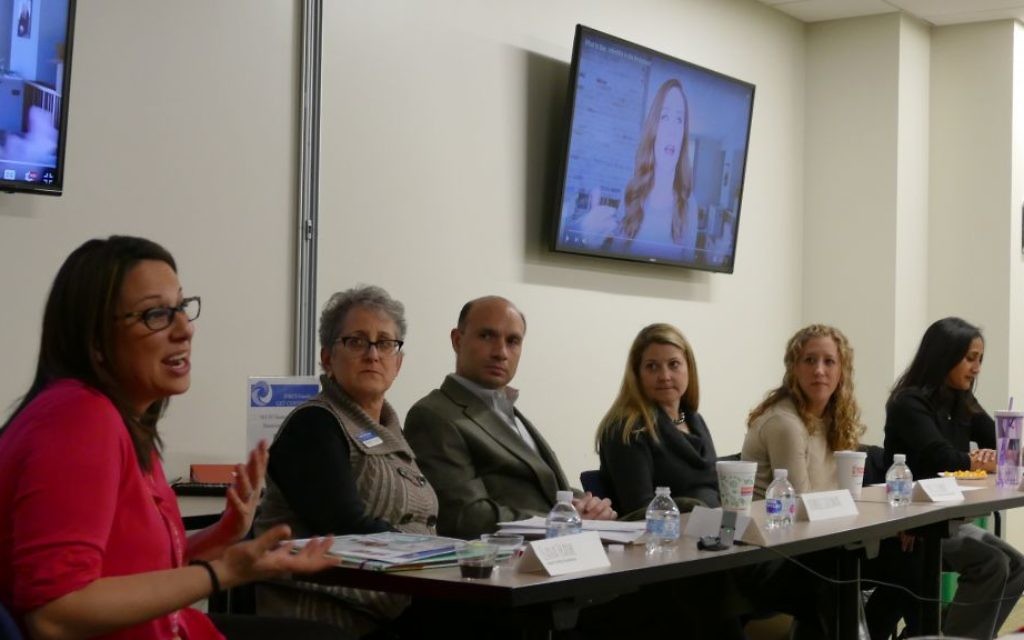Infertility Struggle Calls for Support, Not Shame
The Jewish Fertility Foundation hosted a program on how to support a loved one experiencing infertility.

Lynn Goldman was pushing a stroller with her twins inside when a passer-by asked, “Are they real?” It took Goldman a while to realize the person was asking whether her children were created by in vitro fertilization, but she felt pain from the remark instantly.
Insensitivity toward people who are trying to have a baby is common, but it is something people can change, the adoption and surrogacy lawyer said.
Goldman and her husband, Ronnie, went through many years of infertility until they decided to try IVF. The couple had a baby only after experiencing a number of failures.
Get The AJT Newsletter by email and never miss our top stories Free Sign Up
The Goldmans were among the panelists who spoke at the Jewish Fertility Foundation’s program “Loving Someone With Infertility” on Wednesday, March 21, at Jewish Family & Career Services.
The couple experienced their feelings differently, Lynn Goldman said, but similarly in the sense that it was heartbreaking.
“It wasn’t that my body was just failing me, but it was expensive and affecting my work and family relationships,” she said. The experience was traumatic, and studies have shown that infertility can be as stressful as a life-threatening illness.
Licensed clinical social worker and psychotherapist Tricia Anbinder spoke about the biological, psychological and social effects of infertility on people. Anbinder describes infertility as a medical diagnosis that can disrupt people’s reproductive stories regarding whether they choose to have children and how they want to parent.
That diagnosis, she said, can be the first time people recognize that something in their bodies isn’t working right and is beyond their control. Anbinder said there is also the pain of going through assisted reproduction, such as IVF, which can be invasive and exhausting, plus the risks associated with pregnancy if it is achieved.
She also discussed the psychological impact of infertility, which can lead to an identity crisis or feelings of depression, anxiety and isolation. Anbinder said people often feel that their bodies have betrayed them, depriving them of childbirth, a spiritual connection and a sense of self.
Anbinder said the trauma can lead to symptoms correlated with post-traumatic stress disorder, including flashbacks, difficulty concentrating, social isolation and irritability. Those symptoms can put a strain on marriage, work, and relationships with friends and family.
Psychotherapist and founder of Novo Psychotherapy Shubha Swamy noted some ways people can offer support to those struggling with infertility. Just listening or saying, “I don’t know what to say right now, and I feel sad for you and helpless” can build a connection. She added that checking in from time to time can also helpful.
Swamy warned not to say things such as “Relax, it will just happen,” which can imply that people battling infertility are doing something wrong.
She added that people should refrain from advising adoption, which is expensive and even more invasive than IVF.
Goldman said it is a misconception that there are countless babies available to adopt.
Rabbi Judith Beiner, the JF&CS community chaplain, offered a Jewish perspective on infertility and highlighted some ways to offer support. Start by listening and asking questions instead of just talking, and make sure couples are not alone during the holidays. She also encouraged prayer and ritual as needed.
The Jewish Fertility Foundation offers monthly support groups and is hosting a carnival for a cause as part of a fundraiser Oct. 28.
“Raising awareness and giving people equal access and participation in the Jewish community in whatever way they wish and making them feel as if they belong is part of the Jewish way,” Rabbi Beiner said. She added that how people define a family may sometimes instinctively mean “with children,” but the truth is families come in all forms and combinations.
“People should find a way to encourage others to see their body as holy and inherently full of goodness because as much as there is a head and a heart involved with infertility, your body is what is going to carry you through your whole life, and finding words or ways to help someone may offer a better perspective,” she said.




comments